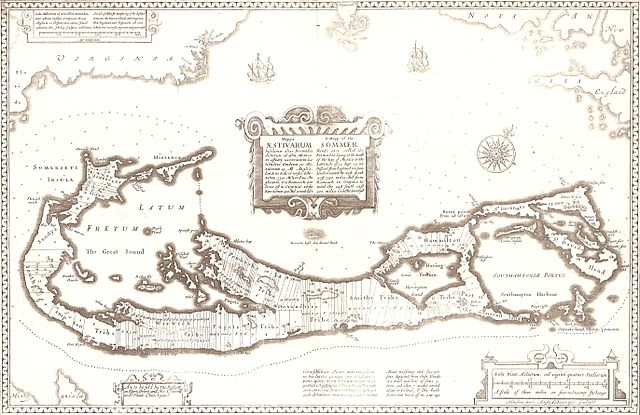When historians discuss familiar networks in relation to political positions, they typically talk about the positive relationships which allowed one family member to appoint a close relative to a position of power in a nepotistic way.[1] The fact that familiar networks also had negative consequences for one or more members of a family network is rarely mentioned. I came across potentiality whilst analysing a set of Colonial Office sources at the National Archives (Kew) surrounding the practices of Governor Samuel Day.
Samuel Day was subject to multiple complaints whilst he headed the Bermudian government. In one case (in late 1699), Day asked Basil Hill (an inhabitant) to lie about one Mr Bellamy – to say that the Bermudian had drunk to the health of King James II –so Day could to arrest Bellamy to regain some money he had lent Bellamy.[2] Another deponent accused Day of clipping money for his own benefit.[3] A further deponent, Henry Pulleine, declared that Day held a man in prison on suspicion of piracy, but would not release him when it was realised that there was no evidence against the supposed pirate.[4]
Pulleine’s account reveals an important piece of information which demonstrates why Samuel Day willingly participated in these activities. When Pulleine said he would complain to the Council of Plantations about Day’s conduct, “the sd Day answerd tt he valued not this Depts nor any others complaints […] saying that he had such an Interest in England and his father [Sir Thomas Day] a Parliament man yt no complaints could hurt him”.[5] Day was so convinced of the strength of his ties in England, and of his family’s unwavering support of him, that he could do whatever he liked in the colony with no consequences.
Word of Samuel’s activities had obviously become the talk of Whitehall, however, as in August 1700 Sir Thomas Day petitioned King William III in person to remove Samuel from the governorship – the King acquiesced.[6] Samuel’s world came crashing down as he had simply put too much strain on his associates. In this case, his reliance on familiar networks was his undoing. This is obviously a very microscopic case-study. However, it is illustrative of the variety of ways by which networks could impact those involved in them. Networks can remain strong – as a plethora of historiography has demonstrated. But, networks can also work against the participants, especially if one member strains the relationship a little too much.
[1] See: John F. Padgett and Christopher K. Ansell, ‘Robust Action and the Rise of the Medici, 1400-1434’, American Journal of Sociology 98, no.6 (1993), 1269-1319; David Veevers, ‘‘Inhabitants of the universe’: global families, kinship networks, and the formation of the early modern colonial state in Asia’, Journal of Global History 10, (2015), 99-121
[2] Deposition of Basil Hill, CO37/3 no.11, TNA
[3] Deposition of William Brice, CO37/3 no.11.III, TNA
[4] Deposition of Henry Pulleine, CO37/7 no.11.IV, TNA
[5] Ibid
[6] Secretary Vernon to Lieutenant Governor Day, 23 August 1700, CO37/3, No.40, TNA
